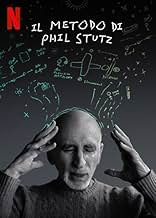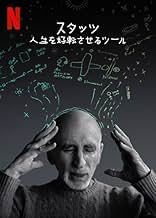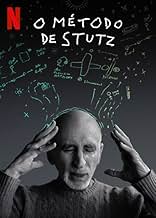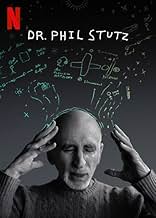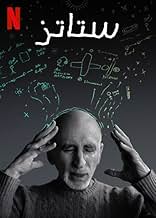CALIFICACIÓN DE IMDb
7.7/10
19 k
TU CALIFICACIÓN
En conversaciones con el actor Jonah Hill, el psiquiatra Phil Stutz explora sus primeras experiencias y un singular modelo terapéutico visual.En conversaciones con el actor Jonah Hill, el psiquiatra Phil Stutz explora sus primeras experiencias y un singular modelo terapéutico visual.En conversaciones con el actor Jonah Hill, el psiquiatra Phil Stutz explora sus primeras experiencias y un singular modelo terapéutico visual.
- Dirección
- Elenco
Resumen
Reviewers say 'Stutz' is a profound documentary delving into Jonah Hill's therapeutic journey with Phil Stutz, emphasizing mental health and vulnerability. It underscores the significance of open dialogue, self-acceptance, and practical therapeutic methods. Audiences value its raw honesty, valuable insights, and emotional resonance. While some critics point out pacing inconsistencies and moments of detachment, 'Stutz' is widely praised for its authentic take on mental health and its capacity to motivate viewers towards positive transformation.
Opiniones destacadas
Dr. Stutz's eclecticism is what makes him a formidable therapist. He was schooled in psychoanalytic theory, but has blended cognitive behavioral therapy, mindfulness and acceptance into a simple yet potent formula to follow.
Step 1: Identify your Part X, a.k.a. Your inner saboteur. These are all the negative messages about yourself from society, community and family that you have internalised. They form barricades that prevent you from reaching your goals and attaining self-actualisaton.
Step 2: Befriend your Shadow. Most people try to run away from their shadow yet the shadow is irrevocably a part of them. It is the side of you that you are the most ashamed of and the reason you are ashamed of it is Part X, the negative messaging. Be compassionate to the shadow by refuting Part X and loving all parts of yourself.
Step 3: Beware the Snapshot. The snapshot is the thing that we think will finally bring us happiness once we have achieved it, and make up for past hurts and disappointments. Hill thought it was fame and success for him but soon plunged into depression when he realised that it did not make his shadow go away. The snapshot is a diversion.
Step 4: Get out of the Maze. This is us holding onto old grievances, demanding that life should be fair when it is not. It keeps us stuck in the past, unable to enjoy life in the present, and contaminates the future. To get out of the Maze, Stutz advocates for Active Love.
Step 5: Exercise Active Love. Embody the love that you wish to receive from the universe and project it onto those who have done you wrong so that you may forgive them for their actions. This is exercising kindness for yourself and empathy for those who have been responsible for your Part X, finally allowing yourself to let go and move on.
Step 6: Use Radical Acceptance. Try not to resist your negative thoughts and feelings. Whatever happens when you get told not to think about a pink elephant? Instead acknowledge the pink elephant, tell it kindly that you will not engage with it and turn your attention to something more productive and rewarding.
Step 7: Practice the Grateful Flow. Surmount Part X by reminding yourself the things that you are grateful for in life, no matter how big or small. This is like a mindfulness practice in that it helps us to ground ourselves and not be carried away by the incessant negative messages from the world.
Stutz says that his biggest fear is not getting enough done before he dies. He has a website offering The Tools, but there is probably an opportunity for a book like the Happiness Trap, which takes people through the steps of Acceptance and Commitment Therapy (ACT).
Step 1: Identify your Part X, a.k.a. Your inner saboteur. These are all the negative messages about yourself from society, community and family that you have internalised. They form barricades that prevent you from reaching your goals and attaining self-actualisaton.
Step 2: Befriend your Shadow. Most people try to run away from their shadow yet the shadow is irrevocably a part of them. It is the side of you that you are the most ashamed of and the reason you are ashamed of it is Part X, the negative messaging. Be compassionate to the shadow by refuting Part X and loving all parts of yourself.
Step 3: Beware the Snapshot. The snapshot is the thing that we think will finally bring us happiness once we have achieved it, and make up for past hurts and disappointments. Hill thought it was fame and success for him but soon plunged into depression when he realised that it did not make his shadow go away. The snapshot is a diversion.
Step 4: Get out of the Maze. This is us holding onto old grievances, demanding that life should be fair when it is not. It keeps us stuck in the past, unable to enjoy life in the present, and contaminates the future. To get out of the Maze, Stutz advocates for Active Love.
Step 5: Exercise Active Love. Embody the love that you wish to receive from the universe and project it onto those who have done you wrong so that you may forgive them for their actions. This is exercising kindness for yourself and empathy for those who have been responsible for your Part X, finally allowing yourself to let go and move on.
Step 6: Use Radical Acceptance. Try not to resist your negative thoughts and feelings. Whatever happens when you get told not to think about a pink elephant? Instead acknowledge the pink elephant, tell it kindly that you will not engage with it and turn your attention to something more productive and rewarding.
Step 7: Practice the Grateful Flow. Surmount Part X by reminding yourself the things that you are grateful for in life, no matter how big or small. This is like a mindfulness practice in that it helps us to ground ourselves and not be carried away by the incessant negative messages from the world.
Stutz says that his biggest fear is not getting enough done before he dies. He has a website offering The Tools, but there is probably an opportunity for a book like the Happiness Trap, which takes people through the steps of Acceptance and Commitment Therapy (ACT).
I have struggled immensely with my mental health over the past 12 years and on a lesser scale the other 29 years of my life. I have had countless therapy sessions, more often than not with one of the sit there and listen, but don't contribute therapists Jonah and Phill discuss near the start of the movie and whilst they were great at allowing me to vent, the only therapists that truly made an impact on me, were the ones who would have an actual conversation with me, call me on my issues and help me explore ways I can improve my life.
Stutz is the perfect example of this method of therapy and I am so grateful for this movie and the wisdom it imparts on us.
Whilst the cinematography, editing and pacing of the movie are all great, what makes Stutz truly remarkable is the vulnerability and truthfulness found within Jonah and Phill's relationship. You can really feel the openness, love and respect between these two people, which allows us as the viewer to be honest with our own answers to the questions posited throughout.
I doubt either of them will ever see this comment, but to Jonah and Phill, if you do see this, I just want to say, thank you. I related to so many of the stories and thoughts that you both shared and even found myself crying when responding to some of the questions you asked. I hope that this reaches as many people as possible and that people gain as much from it as I have.
Stutz is the perfect example of this method of therapy and I am so grateful for this movie and the wisdom it imparts on us.
Whilst the cinematography, editing and pacing of the movie are all great, what makes Stutz truly remarkable is the vulnerability and truthfulness found within Jonah and Phill's relationship. You can really feel the openness, love and respect between these two people, which allows us as the viewer to be honest with our own answers to the questions posited throughout.
I doubt either of them will ever see this comment, but to Jonah and Phill, if you do see this, I just want to say, thank you. I related to so many of the stories and thoughts that you both shared and even found myself crying when responding to some of the questions you asked. I hope that this reaches as many people as possible and that people gain as much from it as I have.
This was really what i needed seeing things from a different angle. Second opinion. Different way to look at things. Learning to accept things we cannot change and live with it. It was really good i couldn't stop myself from crying. They should do like series of each method!!! Not everyone can afford to seek help and this would be an amazing way a platform to reach out to people. It feels comforting to know that we are not alone to feel this way. Everyone is going through things in a million different ways. I wish i had a chance to sit and talk or have a session with Phil Stutz!
Thank you Jonah Hill!!! And Phil Stutz.
Thank you Jonah Hill!!! And Phil Stutz.
It has been my experience that smart people seek out therapy. Further, highly intelligent people need therapy. Unfortunately the topic of therapy is taboo in the Unites States. If you think you may need therapy the chances are that you do. If you are confused about, can't find, afford or commit to finding a therapist this documentary is a great place to start. IMHO (in my humble opinion).
While I'm not a therapist I have benefitted by seeing a therapist a few times during my 62 years on the planet and recognize the value in using the tools described in this documentary. It's relevant and not difficult or hard to watch. I applaud Mr. Hill for having the courage in making this documentary and want to thank Mr. Stutz for his insight and wisdom.
While I'm not a therapist I have benefitted by seeing a therapist a few times during my 62 years on the planet and recognize the value in using the tools described in this documentary. It's relevant and not difficult or hard to watch. I applaud Mr. Hill for having the courage in making this documentary and want to thank Mr. Stutz for his insight and wisdom.
You just have to see this film. No way around it. Just have to. It is just great to be able to see something so simple, short, but yet so effective on your mind - or better yet, your emotional health.
It is so important that we understand the magnitude of the impact our emotions have on us, how they control us if we don't control them - and it all starts with acknowledging them, so this film will help you do just that!
Presenting therapy as something normal, presenting humans as emotional beings - which we really are - will help people allow themselves to be just that, no matter the sex or the age.
The 'tools' presented are also very useful. Thank you for this movie!
It is so important that we understand the magnitude of the impact our emotions have on us, how they control us if we don't control them - and it all starts with acknowledging them, so this film will help you do just that!
Presenting therapy as something normal, presenting humans as emotional beings - which we really are - will help people allow themselves to be just that, no matter the sex or the age.
The 'tools' presented are also very useful. Thank you for this movie!
¿Sabías que…?
- TriviaPhil Stutz wrote a book called The Tools published in 2013 explaining how to apply the techniques Jonah highlights in the film.
- Citas
Phil Stutz: You don't get to the world of meaning through big things. You get it through small things.
- ConexionesReferenced in Film Junk Podcast: Episode 873: Terrifier 2 (2022)
Selecciones populares
Inicia sesión para calificar y agrega a la lista de videos para obtener recomendaciones personalizadas
- How long is Stutz?Con tecnología de Alexa
Detalles
- Tiempo de ejecución
- 1h 36min(96 min)
- Color
- Mezcla de sonido
- Relación de aspecto
- 1.78 : 1
Contribuir a esta página
Sugiere una edición o agrega el contenido que falta



